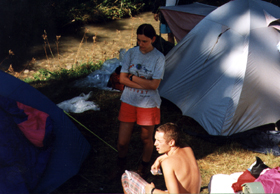

Friday, August 7: Cool, clear morning. We campers sleep in past 8:30. The damn dog doesn't stop barking. Up on the hill, the farmer herds his cattle over the hills.
This is the day we extend ourselves one step farther out, driving to Gheorgheni, the gateway to the Lacu Rosu region. Horses and carts become increasingly common on the roads. We pass through a landscape of plains, not unlike how I imagine Iowa or the Hungarian Puszta, neither of which I've been to. Trim A-frame houses; clapboard and cement cottages in a line. We pass caravans of Roma, and ordinary Romanian families riding in horse-drawn wagons atop sky-high piles of hay. I see farmers walking through fields of wheat with scythes, a scene out of a dusty old painting, but happening in front of my eyes. To me, it all seems like a fantastic dream I'm living through. The kids don't even look twice.
The area around Gheorgheni, a 90% Székely town where we stop for a half-hour break, bears an even stronger resemblance to the Romanian Catskills. Horses and cows leave their calling cards in the road. And you can't miss the Romanian peasants, whose hard lives are, as they say, literally etched into their faces, carving in deep furrows at an early age. They also tend to be rail-thin, painfully so, and their overall aspect reminds me of those 1930s photos of Dust Bowl refugees and people living in tarpaper shacks in Appalachian mining towns. Even the clothing seems the same.
The area where we finally arrive, on the other hand, resembles a Hollywood version of an Alaskan logging camp, all dirt roads, mud, and piney woods, dotted by the occasional trailer or run-down collection of summer vacation cottages and surrounded by the Carpathian foothills. We pitch our tents well down a side road used by loggers, in a hilly meadow which slopes sharply down to a small, muddy creek. We are in a much poorer resort area near another lake, Lacu Rosu, which means Red Lake in Romanian (its Hungarian name translates as Killer Lake). There is no running water here except for the creek, no electricity, and not even an outhouse (the toilet is downstream, behind a high bush). Eva the cook sets her large black cauldron down over some large rocks, and a fire is lit, water boiled and supper cooked. We choose our tents and pitch them; I end up by myself, in a small blue pup tent atop a ridge near the rough fence, made of planks and whole, narrow logs, that separates our campsite from the road. Most of the others set up on top of the damp grass next to the creek. Leo, who's done this sort of thing many times, shows me how to pitch a tent, a better way to wear a backpack, and a number of other small hints for which I'm immensely grateful.

Next door to us is a farmstead in an incredibly decrepit condition, on which I immediately bestow the private name Tobacco Road, inhabited by an elderly Romanian couple. Ma and Pa keep a cow or two and offer us fresh milk for a paltry sum. Leo declines to partake, but I throw in my few cents and am delivered a half-liter or so of the stuff in a plastic bottle. I drink it immediately; delicious, and I feel no ill effects. For now.
